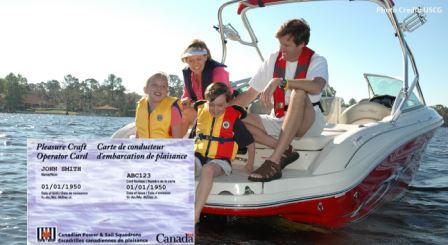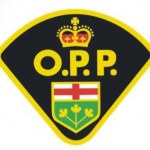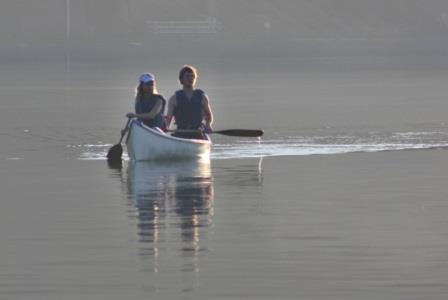Boat and Water Safety
 The FLCA undertook a watercraft carrying capacity study in 2011 to determine the density of watercraft activity and its impact on safety and the lake’s ecosystem. Some water bodies, particular smaller lakes like Farlain Lake, cannot adequately accommodate human demand without crowding and user conflicts. The study determined that the lake is likely to experience multi-use conflicts, and/or environmental degradation in shallow depths as a result of watercraft activity on holiday weekends or during periods of high use. Managing recreational water use conflicts on the lake can be a complex task. Keeping things in perspective is critical to creating an environment of safe and courteous use of Farlain Lake. All persons….you, your family, friends, guests, cottage renters, and lake visitors…are asked to be respectful of the rights of others and adhere to the law and common sense behaviour when on the lake. Working together we will continue to share the lake through courtesy, dialogue, and consideration of others.
The FLCA undertook a watercraft carrying capacity study in 2011 to determine the density of watercraft activity and its impact on safety and the lake’s ecosystem. Some water bodies, particular smaller lakes like Farlain Lake, cannot adequately accommodate human demand without crowding and user conflicts. The study determined that the lake is likely to experience multi-use conflicts, and/or environmental degradation in shallow depths as a result of watercraft activity on holiday weekends or during periods of high use. Managing recreational water use conflicts on the lake can be a complex task. Keeping things in perspective is critical to creating an environment of safe and courteous use of Farlain Lake. All persons….you, your family, friends, guests, cottage renters, and lake visitors…are asked to be respectful of the rights of others and adhere to the law and common sense behaviour when on the lake. Working together we will continue to share the lake through courtesy, dialogue, and consideration of others.
It’s The Law
Federal and provincial regulations govern Farlain Lake. On our lake the Southern Georgian Bay OPP Marine Water Patrol will make occasional spot check visits to enforce water safety related laws and regulations. All types of watercraft are subject to the various laws and regulations at all times, regardless of who is operating them. This includes all forms of non-motorized watercraft. See the Transport Canada government web site for updates on pleasure craft licensing and registration. All new, transferred and renewed Pleasure Craft licences are now only valid for 5 years and have an expiry date. See the web site for a chart showing the new expiry date depending on when the licences currently without an expiry date were issued. Starting December 31, 2027, wind-powered pleasure craft over 6 metres long will need a Pleasure Craft licence.
Please note that a Pleasure Craft Licence is different from a Pleasure Craft Operator Card which is required to operate a power-driven pleasure craft.
a) Equipment
All watercraft, including powerboats, PWCS, canoes, kayaks, sailboats, sailboards, stand up paddle boards, paddle boats, and other watercraft are required to have safety equipment on board. The type and amount of equipment is determined by the size of watercraft. Minimum fines for each infraction range from $100 (lack of a paddle/oar or anchor) to $200 (lack of a life-jacket for each person on board).
 b) Competency
b) Competency
All operators of all powerboats and PWCs require a Pleasure Craft Operator Card and they must have proof of operator competency by having their card on them at all times when operating a powered watercraft. Operators without proof of ‘competency’ could face fines as much as $250.
c) 10/30 Rule
All powered watercraft must operate at a speed of 10 km/h or less when within 30 metres of shore. An exception to this rule on Farlain Lake pertains to water skiing or wakeboarding; the vessel must follow a trajectory perpendicular to the shore. The vessel is not permitted to run parallel at a speed exceeding 10 km/h until at least 30 metres from shore.
d) Booze and You Lose
Alcohol is involved in over 40% of all power boating accidents. Pleasure craft operators must not drive under the influence (alcohol, drugs). Anyone caught operating a pleasure craft under the influence of alcohol or drugs will face the same penalties as motorists; your Ontario driver’s licence will be suspended or if you are found to be legally impaired while operating a motor boat you will lose your driver’s licence for a year or more and face a hefty fine.
e) Towed Water Sports
A ‘qualified’ observer or spotter over the age of 16 is required for all behind the powered watercraft activities. Boat operators are not considered observers/spotters. There must be a spotter and a seat available on a PWC for each person being towed; it is not legal to tow a skier, wakeboarder, or a tuber with a two seat PWC. Towing activities must not occur ½ hour before sunrise and ½ hour after sunset.
f) Common Courtesy
Some boaters do not consider the rights and needs of others or the environment. There are common courtesies that will make sharing Farlain Lake more pleasant for all of us.
- Keep the Bow Low Trim your powered watercraft and adjust your speed to minimize your wake. Waves generated by boats can capsize smaller non-powered watercraft, and potentially damage moored boats and docks, and impact wildlife and the aquatic environment.
- Water Activity – Be sensitive to others relaxing on their docks and shoreline. Don’t stay in one area too long making repeated runs in front of the same lake properties.
- Right of Way Powered watercraft are required to heed the right of way of all non-powered watercraft including sailboats, canoes, kayaks, paddle boats, stand up paddle boards, and windsurfers.
- Never buzz or tail another watercraft, jump the wake of another powered watercraft, or try to spray other watercraft or swimmers.
Lake Swimming Safety
Just as watercraft can pose a danger to swimmers, swimmers can pose a danger to powered watercraft as well as themselves.
- Never Swim Alone
- When venturing out into the deeper open areas of the lake swim with a buddy in a watercraft. Power watercraft operators can readily observe another watercraft but may have difficulty seeing a swimmer in the water due to the sun’s glare, choppy waves, or low light conditions at dusk or dawn.
Check out the Canadian Red Cross Summer Water Safety information.
Be mindful and observant
If you see a powered watercraft being operated in a way that causes you concern or you think is violating the law:
- Please call the OPP at phone number 1-888-310-1122 for non-urgent issues
- Provide the police with the following information:
- a) Description of the watercraft
- b) Registration number of the watercraft
- c) Description of the operator
- d) Nature of the incident
- e) Any photo images of the incident
Contact for Additional Information:
Dave Moffat – Provincial Marine Programs
Email: david.moffat@opp.ca
PH: (705) 329-6125
and

